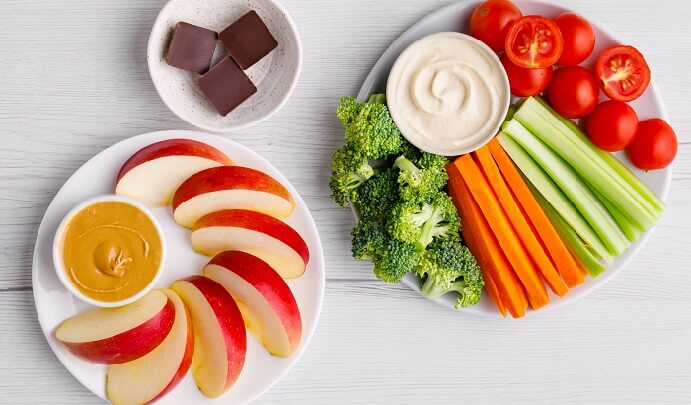High levels of cholesterol, particularly “bad cholesterol” and triglycerides, have been associated with an increased risk of developing coronary heart disease.
Therefore, for some people lowering their cholesterol levels is essential to staying healthy.
Interestingly, research confirms that vegetarian and vegan diets can help lower total and bad cholesterol in the blood. However, they also warn that the relationship with good cholesterol is not the best.
Read on to find out the effects of vegetarian diets on cholesterol and why researchers say they help lower bad cholesterol.
RELATED: How to Lower Bad Cholesterol?
Vegetarian diets lower cholesterol.
The word cholesterol is a broad term and often confuses many people. So before thinking about raising or lowering cholesterol, you must first understand what we are talking about.
On the one hand, the levels of total cholesterol (TC), bad cholesterol (LDL), and high triglycerides have been related to an increased risk of heart disease, so at these values, it is better to lower them.
On the other, HDL levels or good cholesterol can be helpful for the cardiovascular system, and its values are associated with protective functions, so raising this type of cholesterol is something desirable.
Now, how do vegetarian diets affect the different types of cholesterol?
According to a review published by the American Heart Association, vegetarian diets could effectively lower all types of cholesterol. (1)
In this study, a significant decrease in good and bad cholesterol and triglycerides was observed in the participants who ate a vegetarian diet.
Another review states that vegetarians and fish eaters tend to have lower BMI, blood pressure, and cholesterol levels and states that there is a likelihood that these factors reduce the risk of heart disease. (3)
The authors hypothesize that vegetarian diets have a positive impact on body weight and general health, which may help regulate plasma lipids.
Another study published by the British Medical Journal states that regular physical exercise and strict vegetarian or vegan diets can reduce good cholesterol excessively. According to the researchers, this could be considered an unhealthy factor. (2)
RELATED: Vegan Diet – A Beginner’s Guide
So does being a vegetarian help lower cholesterol?
Overall, no study provides sufficient evidence that people should switch to a vegetarian or vegan diet for high cholesterol.
It is possible to have normal cholesterol levels whether you eat meat or not.
However, too many cold cuts, hamburgers, poor-quality meats, and too much sugar will considerably increase your harmful cholesterol levels.
In addition, people who eat a diet rich in ultra-processed foods, both vegetarian and meat, tend to have a higher risk of metabolic disorders closely related to heart health.
So, to avoid possible heart disease, whether you choose a vegetarian or carnivorous diet, you must control foods with excess sugar, trans fats, and saturated fats.
In addition, a good measure for those who have hypertension is to check their blood pressure and cholesterol levels periodically.
Other causes of high cholesterol
It is also essential to recognize the limitations of research and interference with cholesterol values and causes other than the intake of meat or vegetables.
Although researchers try to account for most of the potential factors that affect cholesterol, they cannot explain everything.
For example, vegetarians tend to be younger than meat-eaters, are more physically active, and are less likely to smoke. Furthermore, the influence of genes on the production of bad cholesterol is known to be high.
- Poor diet Eating saturated fat and trans fat found in cookies and popcorn can raise your cholesterol level. Other foods, such as deli meats and whole dairy products, will increase your blood cholesterol.
- Obesity. Having a body mass index (BMI) of 30 or higher puts you at risk for high cholesterol.
- Lack of exercise. Exercise helps increase your body’s HDL or “good” cholesterol while increasing the size of the particles that make up LDL or “bad” cholesterol, making it less harmful.
- Smoking . Smoking cigarettes damages the walls of your blood vessels, making them more likely to accumulate fat deposits. Smoking could also lower your HDL level.
- Age. Because your body chemistry changes as you age, your risk for high cholesterol increases. For example, your liver cannot remove lousy LDL cholesterol as you age.
- Diabetes. High blood sugar contributes to higher levels of a dangerous type of cholesterol called very-low-density lipoprotein (VLDL) and lower HDL. High blood sugar also damages the lining of the arteries.
ABSTRACT
Vegetarian diets help reduce bad cholesterol (LDL) and triglyceride levels. However, they could also minimize HDL or good cholesterol.
Studies suggest that the essential thing to have healthy cholesterol values is avoiding refined carbohydrates and foods with poor quality fats.
Following a healthy vegetarian diet and consuming meat in moderate amounts help lower cholesterol. Although, of course, many people choose a vegetarian diet primarily for ethical reasons rather than health reasons.







